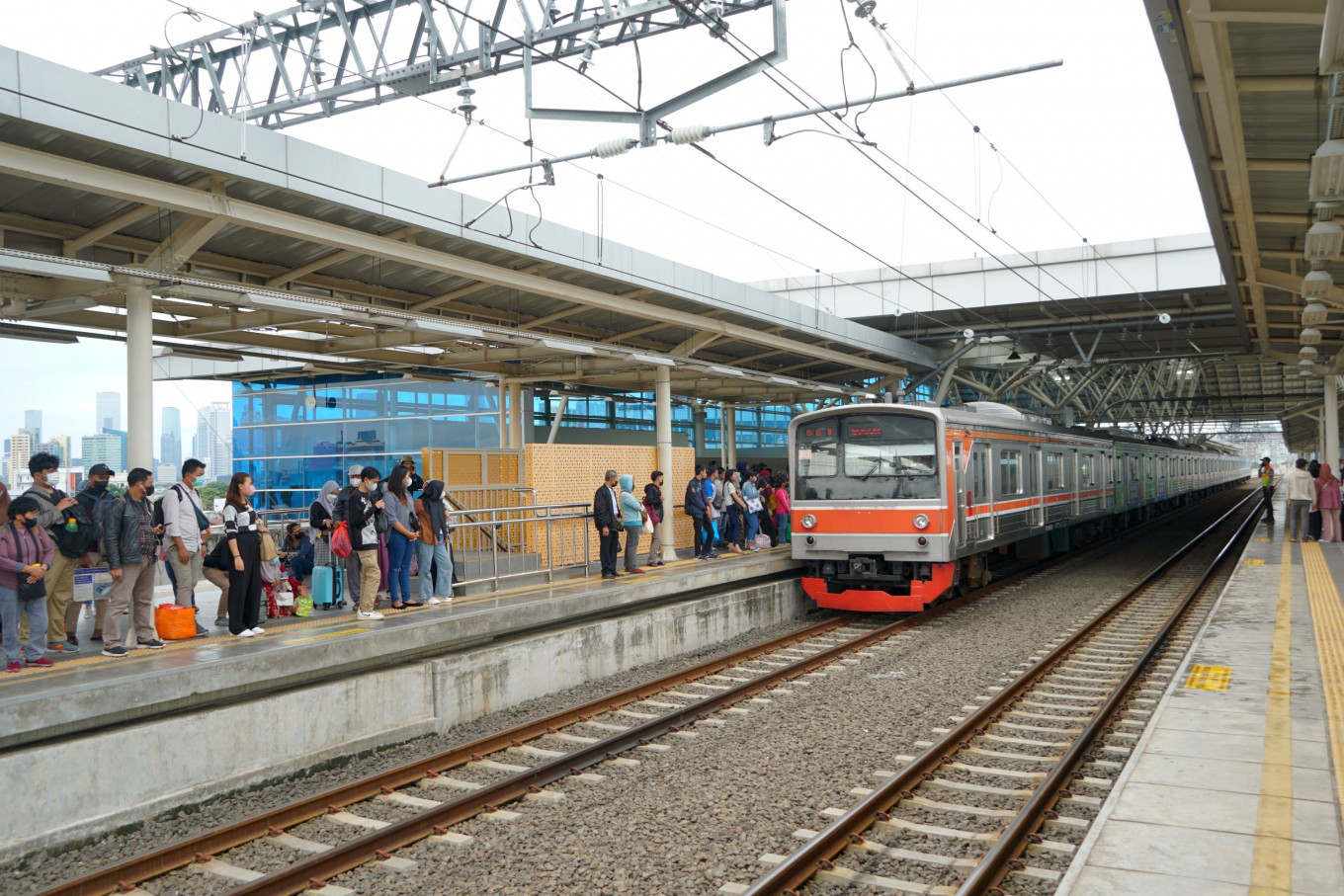Popular Reads
Top Results
Can't find what you're looking for?
View all search resultsPopular Reads
Top Results
Can't find what you're looking for?
View all search resultsMinistry blocks Commuter Line plan to buy Japanese trains
Change text size
Gift Premium Articles
to Anyone
R
ail commuters face a reduction in service as Commuter Line service operator PT Kereta Commuter Indonesia (KCI) plans to retire 10 trains due to old age this year, while the importation of used Japanese trains has been met with resistance from the Industry Ministry.
Currently, KCI has 106 trains in operation capable of serving 1.2 million passengers in the Greater Jakarta area per day, with each train consisting of eight to 12 individual cars. KCI corporate secretary Anne Purba said that in order to accommodate the 1,081 journeys KCI serves daily, the company needs a minimum of 96 operational trains.
“If we reduce the number of trains, of course it’s going to reduce the level of service. Even now, passengers have to jostle for space,” said Anne, as quoted by Koran Tempo. Aside from the 10 trains that are due to be retired this year, KCI is also planning to retire an additional 19 trains by the end of 2024 without any means to replace them until 2025 at the earliest.
Anne was not immediately available for comment when The Jakarta Post contacted her.
The rail service operator initially planned to import used Japanese trains to replace the old cars, and has made a purchase request to the Trade Ministry and the Industry Ministry. But, citing a failure to meet the 40 percent local content requirements (TKDN), the Industry Ministry has blocked the request.
“PT Industri Kereta Api [INKA] is capable of producing these trains, so why do we still have to import from Japan? We have to take pride in using Indonesian-made products, and even Bangladesh has bought Rp 1.3 trillion [US$85.2 million] worth of our trains,” said Industry Ministry secretary-general Dody Wiyodo, as quoted by Antara.
But given the urgency of the situation, an expert from the Indonesian Transportation Society (MTI) encouraged the relevant stakeholders to provide an exemption, with several caveats.
“They can, for example, limit the number of cars that’s going to be imported. [...] And before the trains are put into service, KCI as the operator could retrofit the cars with locally-made components so that the imported cars could still meet the [TKDN requirements],” MTI’s head of railway division Aditya Dwi Laksana told the Post on Tuesday.
Reliability concerns
KCI already has plans to purchase 16 additional trains from INKA in order to meet its goal of reaching the 2 million passenger milestone. The two parties are set to finalize the Rp 4 trillion worth of contract by March, which Anne said was considerably more expensive than if the company were to import old Japanese trains. She also added that INKA production “won’t be completed until 2025 or 2026.”
The railway operator has long used Japanese trains, and in 2013 entered a partnership with East Japan Railways for the purpose of importing these trains. Several of the Tokyo 6000 series rolling stock that are currently in use, for example, rolled out of the production line in 1984 and had been in use in Japan for decades before KCI brought them to Jakarta in 2018.
Given the age, KCI plans to retire some of the older trains from its fleet in 2023 and 2024. But even these decades-old trains have proven to be more reliable than the INKA-made trains the railway operator used from 2011 to 2019, produced in cooperation with German-based manufacturer Bombardier Transportation, according to MTI.
“The KFV trains often break down, and the doors often get mixed up with the right doors opening instead of the ones on the left,” said Aditya, referring to the INKA-made commuter trains by its colloquial name.
After passenger complaints, KCI eventually pulled these trains from operation and moved them to the Yogyakarta-Surakarta commuter line, which has lower passenger numbers. Aditya added however, that INKA had made some strides since then, with the INKA-made Rail link airport train used in Jakarta generally encountering no issues since its inauguration in 2017.
Aside from the reliability concerns however, Aditya is concerned that unless INKA could accelerate production, commuters are facing a temporary decrease in railway capacity, putting extra strain on traffic in Greater Jakarta.
KCI management is reportedly still in contact with the two ministries for permission to import the old Japanese trains. But if talks fall through, commuters face a possible service deterioration until 2025, on top of the current overcrowding issue at Manggarai Station.
Commuters have since started an online petition on Change.org asking for the Industry Ministry to give the green light.










